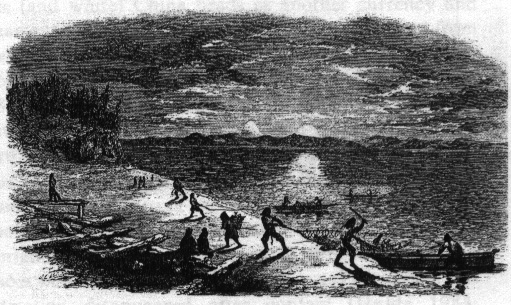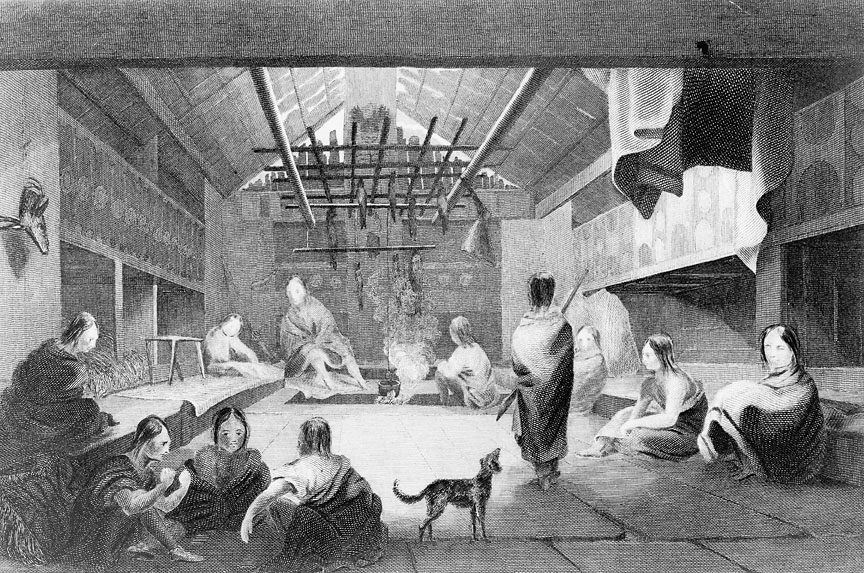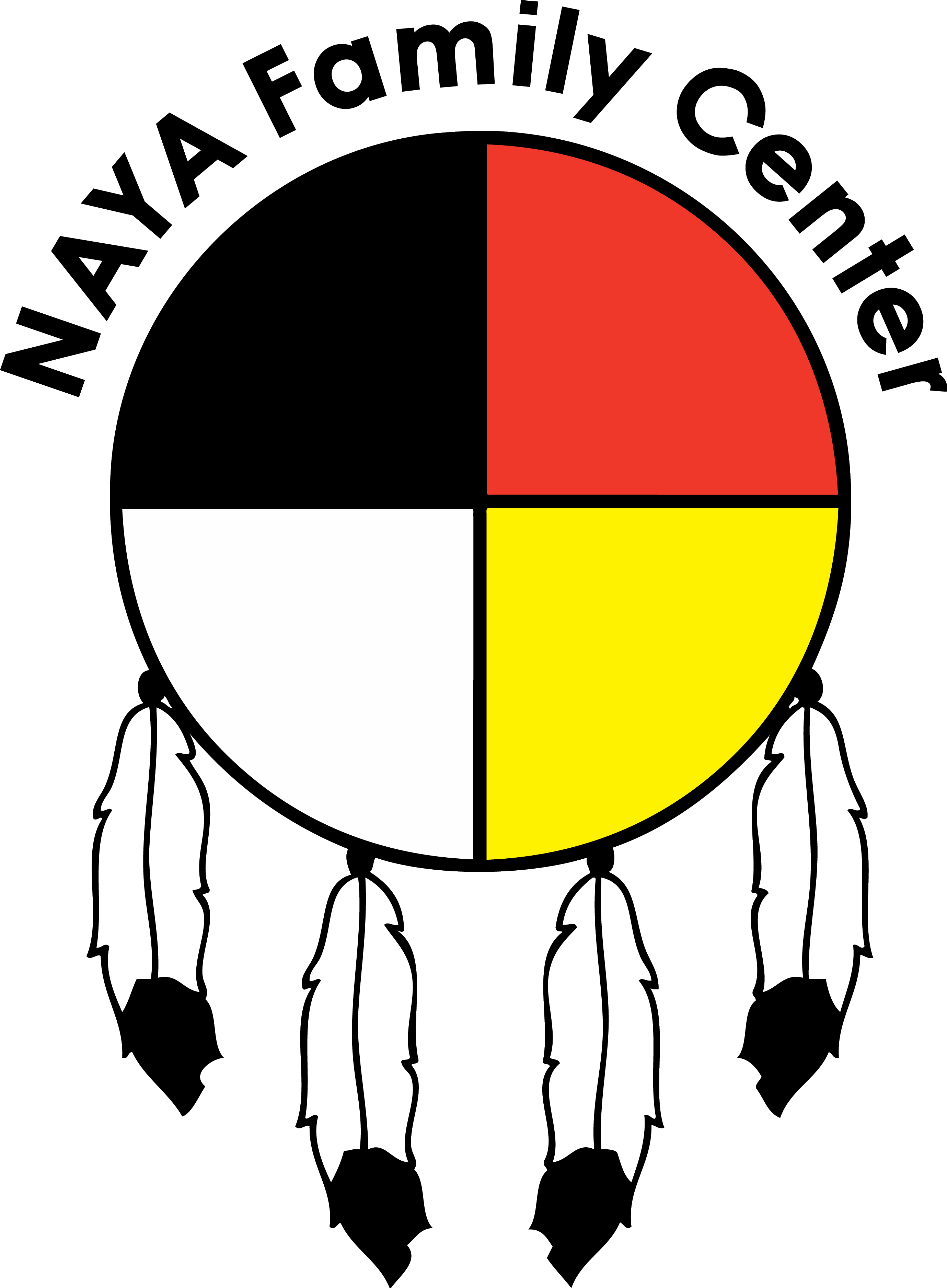Naya history
NAYA does not offer land acknowledgements or Native American History resources to outside organizations or individuals. We encourage everyone to learn and know whose lands you are on, as well as learn about the diverse Native history of this area. On this page, you can learn about the lands where NAYA operates, and our history as a Native-led organization.
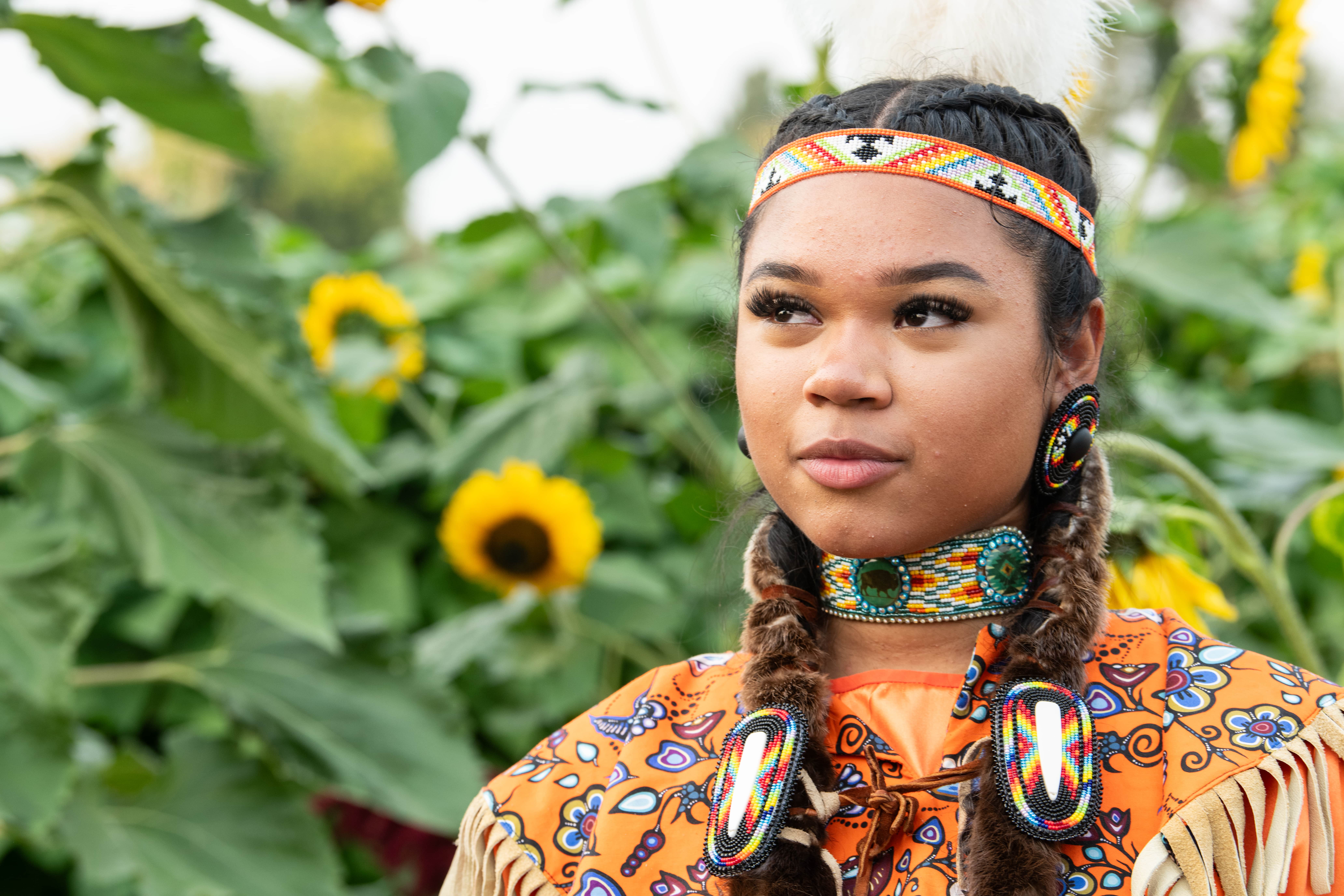
Portland, located in Multnomah County, resides on the traditional lands of the Multnomah, Kathlamet, Clackamas, Cowlitz, Tualatin Kalapuya, Molalla, Chinook, Wasco, and more. As Indigenous people, it is important that we acknowledge that the lands on which our campus depends were once the site of Neerchokikoo, a thriving fishing village of the Multnomah Chinook, frequented by many other tribes since time immemorial. Members of the Chinook tribe granted our request for permission to take on stewardship of the land when NAYA purchased an abandoned PPS property in the 1990s.
Ever since white colonizers landed on the shores of Turtle Island, made their way west through a campaign of genocide and erasure, and entered the Columbia River, Native Americans in Oregon have endured racist policies and practices meant to dispossess us of land, community, and sovereignty through displacement and discrimination. Displacement occurred through forced relocation to reservations, removal of our tribes’ lands, and the termination of tribal status, all of which limited sovereignty and mobility.
Between 1900 and 1950 the percentage of US Native peoples living in urban areas grew from less than 1% to more than 13%. World War II drove many Native Americans looking for work to urban centers like Portland. After the war, the federal government forcibly moved approximately one-third of Native Americans from reservations to urban areas. In 1952, the federal Bureau of Indian Affairs (BIA) officially launched the Voluntary Relocation Program, which sought to entice Native Americans to move to cities with the promise of training, jobs, and housing. Portland became a BIA headquarters, overseeing Native land policies in Oregon, Washington, and Idaho. In 1956, Portland was designated as an urban area for Native relocation. Four years later, Congress passed the Indian Relocation Act, also known as the Adult Vocational Training Program, which sought to provide Native young adults with two years of training and education. Thousands of Native Americans moved to cities, however, they did not have the support promised by the BIA to adjust to urban living, as relocation offices were considerably underfunded and understaffed. Those wishing to move back to reservations experienced prohibitive cost barriers as BIA refused to fund return trips, making relocation a one-way journey for many Native families.
Relocation was one among many policies that interrupted traditional lifeways through intentional legal discrimination. Another such discriminatory policy outcome is the ongoing erasure of Native peoples’ existence from official records. Population counts achieved through community participatory research are more accurate than those done by dominant institutions connected to a history of genocidal practices. NAYA co-founded the Coalition of Communities of Color in partnership with other culturally specific organizations in part to meet the need for trusted data on our communities. The most recent community-verified count of Native Americans in the Portland metropolitan area tells us approximately 90,000 Native people call our city and region home. American Community Survey (census) data consistently underrepresents this number. Portland is home to Native Americans from over 400 tribes.
The alarming rates of homelessness, poverty, substance use, domestic violence, and more that we see today are directly influenced by this intentionally discriminatory history. Multnomah County is home to 4,015 individuals who meet the HUD definition of “homeless.” The greatest disparity among communities of color is experienced by Native Americans, who are over 400% more likely to be homeless compared to people who are white. A 2021 Point in Time report counting the houseless population on January 26, 2021 to snapshot overall houselessness trends showed Native peoples’ overrepresentation in houselessness increasing at a rate of 30% per year, a more significant increase than among any other ethnic group. The 2019 Poverty in Multnomah County Report shows 30% of the County’s Native population lives in poverty, earning only 63% of median incomes in white-only households. Our unemployment rate is double (8.8%) the rate of whites, and our graduation rate 13% lower than whites.
But an intergenerational web of community leaders, institutions, and relational systems create spaces of balance and belonging and fight to correct the underlying imbalances negatively impacting our people. While Native Americans in Portland have experienced great trauma created by local and federal policies designed to strip away our resources, sovereignty, and identity, we have also built a resilient and vibrant community centered on relationships, culture, and well-being. We achieved this by drawing on deep historical, spiritual, and cultural strengths, combining this resolve with traditions of adaptation, innovation, community, and resistance.
Throughout our history, we’ve sustained our diverse traditions while expanding and modernizing our programs and services to meet the needs of our people. In 1994, NAYA incorporated as a nonprofit organization, now named the Native American Youth and Family Center, enabling us to receive more resources and expanding our ability to meet community need. In 1997, we hired our first staff person. In 2006 we moved to Neerchokikoo, where in 2007 we founded our alternative high school, which was then called the Early College Academy. In 2009 we purchased the historic Lakeside building from PPS, assuming control of the site and taking on the associated mortgage debts. In 2013, NAYA opened our first affordable housing project, Kah San Chako Haws, in the Lents neighborhood.
NAYA’s Board of Directors made the decision to found the 501c4 NAYA Action Fund in 2020, during the dark winter of the Covid-19 pandemic, when the new organization’s Board of Directors could only meet on Zoom. NAYA Family Center was busy helping families make ends meet, receive food boxes, and get vaccinated. Responding to that urgent moment required focused community care and compassion as NAYA provided rental, housing, and utility assistance. In spite of the pandemic, NAYA continued to steward generational impacts for our community. Hundreds of new units of affordable housing opened with NAYA’s support during the early pandemic. In 2023, NAYA opened the first tribal preference housing in the Portland area, in partnership with the Confederated Tribe of Siletz Indians. In 2025, NAYA completed our first project as a nonprofit tribal developer with Tistilal Village.
Today, Native people find culture, education, direct support and resources at the Native American Youth and Family Center. Our more than 40 programs and services embrace our diverse Native cultures and traditions and wrap around community. We invite our region’s more than 90,000 Native people to join the Elders for yoga, learn how to buy a home, participate in ceremony or our annual powwow, or explore the Many Nations Academy.
NAYA stewards generous gifts from close relationships to ensure community self-determination for generations to come. Monthly and annual donors contribute to hundreds of thousands of hours of service, which benefits more than 10,000 individuals from more than 380 tribes each year. Donations to NAYA ensure student success, family stability, thriving Native Elders, and leadership for an abundant future.
NAYA trains community leaders to use their voices for Native self-determination and prosperity. We bring our values to advocacy that addresses historic injustices and ensures future generations have every resource available. Good governments are responsive to the needs and wishes of Native people, and recognize we are active and engaged civic leaders and voters who will not be overlooked or treated as expendable.
At NAYA we come together to steward our organization and lands to reliably meet community needs. One of the largest employers of urban Native people in the Pacific Northwest, NAYA’s culture of service begins with our staff. We celebrate the diverse experiences and identities each of us brings to serving the Native community. Many of us are program participants who have returned to serve. No matter our differences, we share the values of Respect, Balance, Pride, Giving, Community, Tradition, Kindness, Accountability, Diversity, and Leadership.
Prior to NAYA’s existence, Native leaders formed several organizations to meet the needs of the growing community. The Voice of the American Indian Association (VAIA) and the Portland American Indian Center (PAIC) were founded in 1959 to serve Native Americans living on reservations and in the city. They provided services and economic assistance, built community, and taught and celebrated Native culture. Though VAIA dissolved in the mid-1960s, PAIC became a powerful organization connecting urban Natives to culture through programs like annual summer powwows. Working with other communities of color to provide education for adults and youth, the Chicano Indian Study Center of Oregon (CISCO) grew into one of the foremost Native hubs in the country and sponsored the founding of NAYA in 1974 before closing its doors in 1977.
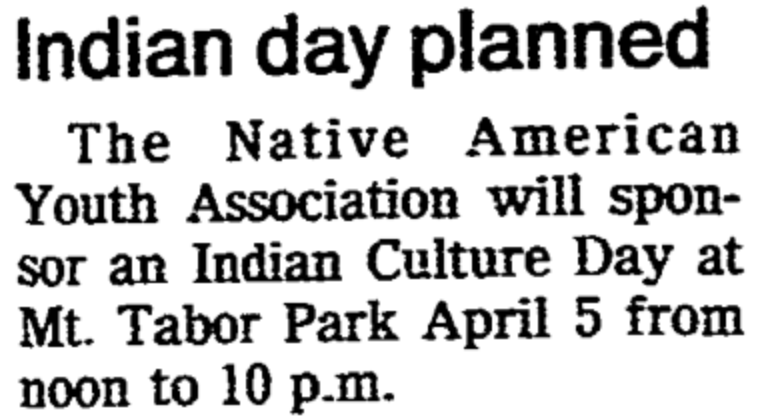
The Native American Youth Association was founded by parent and Elder volunteers in 1974, in response to a critical need for services provided by and for Native Americans. They provided Native students with after-school activities centered on sports, and tutoring help to keep students engaged in community and their education.
Throughout our history, we’ve sustained our diverse traditions while expanding and modernizing our programs and services to meet the needs of our people. In 1994, NAYA incorporated as a nonprofit organization, now named the Native American Youth and Family Center, enabling us to receive more resources and expanding our ability to meet community need. In 1997, we hired our first staff person. In 2006 we moved to Neerchokikoo, where in 2007 we founded our alternative high school, which was then called the Early College Academy. In 2009 we purchased the historic Lakeside building from PPS, assuming control of the site and taking on the associated mortgage debts. In 2013, NAYA opened our first affordable housing project, Kah San Chako Haws, in the Lents neighborhood.
NAYA’s Board of Directors made the decision to found the 501c4 NAYA Action Fund in 2020, during the dark winter of the Covid-19 pandemic, when the new organization’s Board of Directors could only meet on Zoom. NAYA Family Center was busy helping families make ends meet, receive food boxes, and get vaccinated. Responding to that urgent moment required focused community care and compassion as NAYA provided rental, housing, and utility assistance. In spite of the pandemic, NAYA continued to steward generational impacts for our community. Hundreds of new units of affordable housing opened with NAYA’s support during the early pandemic. In 2023, NAYA opened the first tribal preference housing in the Portland area, in partnership with the Confederated Tribe of Siletz Indians. In 2025, NAYA completed our first project as a nonprofit tribal developer with Tistilal Village.
Today, Native people find culture, education, direct support and resources at the Native American Youth and Family Center. Our more than 40 programs and services embrace our diverse Native cultures and traditions and wrap around community. We invite our region’s more than 90,000 Native people to join the Elders for yoga, learn how to buy a home, participate in ceremony or our annual powwow, or explore the Many Nations Academy.
NAYA stewards generous gifts from close relationships to ensure community self-determination for generations to come. Monthly and annual donors contribute to hundreds of thousands of hours of service, which benefits more than 10,000 individuals from more than 380 tribes each year. Donations to NAYA ensure student success, family stability, thriving Native Elders, and leadership for an abundant future.
NAYA trains community leaders to use their voices for Native self-determination and prosperity. We bring our values to advocacy that addresses historic injustices and ensures future generations have every resource available. Good governments are responsive to the needs and wishes of Native people, and recognize we are active and engaged civic leaders and voters who will not be overlooked or treated as expendable.
At NAYA we come together to steward our organization and lands to reliably meet community needs. One of the largest employers of urban Native people in the Pacific Northwest, NAYA’s culture of service begins with our staff. We celebrate the diverse experiences and identities each of us brings to serving the Native community. Many of us are program participants who have returned to serve. No matter our differences, we share the values of Respect, Balance, Pride, Giving, Community, Tradition, Kindness, Accountability, Diversity, and Leadership.


donate today
We honor those who contribute to NAYA's service to the Native American community.
STAY CONNECTED!
Trust us to send you resources, event invitations, and stories of community impact.
.png)

